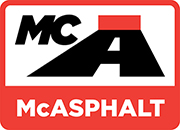Dense Graded Mixes
Dense graded mixes are medium air void mixes that are high in strength and use affordable crusher-run aggregates. Low water impermeability greatly improves freeze/thaw characteristics.
Design Criteria
When designing a dense graded mix a number of factors have to be examined and assessed to ensure a proper surface will be placed that will perform for its service life. The following factors can have a tremendous effect on the performance of a dense graded mix; aggregate shape, mix workability, aggregate type, coating ability and residual asphalt content. If these factors are addressed the chances of a good dense graded mix being placed are greatly increased.
Aggregate Shape and Type:
The overall shape of the mix aggregate can influence the quantity of aggregate as well as the amount of asphalt emulsion to be used. The more graded the aggregate is the higher the emulsion quantity needed. The compatibility of the emulsion used with the aggregate is critical.
Mix Workability:
The emulsion used should give the finished mix enough workability to be laid evenly and homogeneously and be designed for the intended method of processing be it immediate placement or in a stockpile.
Coating Ability:
The asphalt emulsion should have the ability to coat the fine aggregate (pass 4.75 mm) without the fine aggregate balling up. With some emulsions the use of mixing water will aid in coating the fines.
Asphalt Residual in the Emulsion:
The quantity of asphalt residual in the emulsion can affect the quantity of emulsion needed to coat the aggregate. The lower the residual the higher the quantity of asphalt emulsion needed.
During the design process the two key factors that are needed is a well coated mix combined with adequate strength and stability which will be able to handle the traffic load and volume.
If these factors are taken into consideration in designing the dense graded mix then the chances of a successful mix are greatly improved. Typically a dense graded mix would require an emulsion content of 5.5 – 7.0%, a minimum of 2500 Newtons stability at 25°C and air voids of 7 – 11%.
Materials
Asphalt Emulsions:
Several factors have to be taken into account when choosing the emulsion to be used. The type and grade of emulsion is affected by the aggregate, the coating ability, the compatibility, the mixing method, the environmental conditions as well as the laying and compaction process. The most widely used grades of asphalt emulsion used in dense graded mixes are SS-1, CSS-1, MS-2 and CMS-2. In recent years proprietary type emulsions have been developed for use in dense graded mixes.
Mix Aggregate:
The mix aggregate used in dense graded mixes can be processed or semi-processed crusher, pit or bank run aggregates. Most are graded from a maximum size of 25 mm with material passing the 75 micron sieve. They should have very low clay content and not have an excessive amount of pass 75 micron material.
Performance Guidelines
In order to construct a proper well designed dense graded mix the following guidelines should be followed:
- Assure the existing pavement structure or base material is adequate to support expected traffic
- Determine mixing process to be used
- Determine emulsion grade and type to be used is well designed for chosen mixing process
- Design a dense graded mix with aggregate to be used on job
- Use a clay free hard crushed aggregate having a well graded appearance
- Ensure asphalt emulsion and aggregate are compatible
- Ensure adequate emulsion is used
- Ensure aggregate is moist but not saturated
- Ensure the mix is workable and the fines are well coated
- Calibrate and inspect all equipment
- Use sufficient number and properly weighted pneumatic and steel rollers in static mode
- Follow proper construction techniques
- Use traffic control to protect mix
- Work only in weather suitable for type and grade of emulsion being used
- Once mix is cured it should be covered with a thin wearing surface such as a chip seal or sand seal
